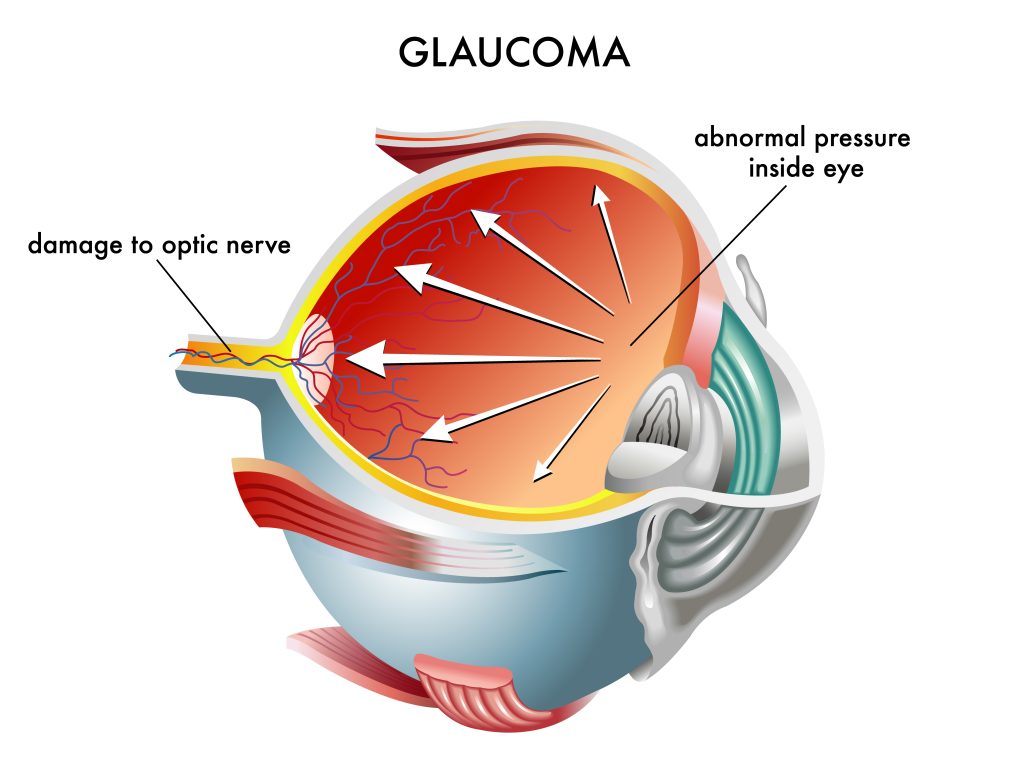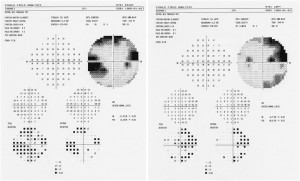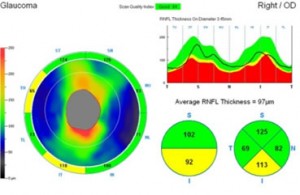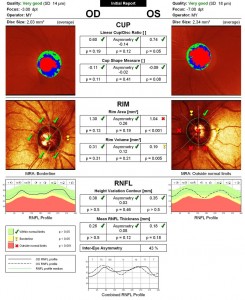Glaucoma Management Toronto
Glaucoma refers to a group of eye diseases that damage the optic nerve and cause vision loss. Usually this damage is associated with increased intraocular pressure (IOP). This debilitating condition is one of the leading causes of blindness in Canada.
It is important to maintain routine eye examinations, as most forms of glaucoma often have no symptoms until vision loss occurs. During a routine examination, Dr. Skouras is able to detect any risk factors that may lead to glaucoma and provide any necessary diagnostic testing or treatment.
Causes, Symptoms, and Diagnosis
There are several forms of glaucoma, the most common of which are open-angle glaucoma and angle-closure glaucoma.
- Open-angle glaucoma: Open-angle glaucoma is the most common form of glaucoma. While it appears the structure of the eye is normal, fluid does not drain properly and begins to cause damage to the optic nerve. It is unknown what causes open-angle glaucoma, although we do know that genetics play a big role; if someone in your family has had glaucoma, you are at increased risk of developing the disease. Those with open-angle glaucoma are less likely to notice symptoms until the disease has progressed to the point where the optic nerve has been permanently damaged.
- Narrow angle glaucoma: The onset of angle-closure glaucoma occurs quickly when the exit of aqueous humor fluid is obstructed. When this occurs, intraocular pressure spikes, with pain and vision loss soon following. Nausea, vomiting, and rainbow-colored halos around lights are other signs of angle-closure glaucoma.
During a routine examination, Dr. Skouras evaluates the risk of glaucoma based on family history, intraocular pressure and assessment of the optic nerve. Based on the findings of the examination, other diagnostic scans may be required.
Dr. Skouras recommends adults maintain routine eye exams every 1-2 years. It is especially essential that patients of African descent and those with a family history of glaucoma maintain regular eye exams to catch problems in their earliest stages. To help diagnose and monitor potential risk of glaucoma, several diagnostic scans will be performed on a regular basis. These include visual field perimetry testing, optical coherence tomography (OCT), and Heidelberg retinal tomography (HRT).
Glaucoma Treatment
There are several types of treatment for open-angle glaucoma, the most common being eye drops. These eye drops will increase the circulation of eye fluid and lower eye pressure, either by decreasing the production of fluid within the eye, or by increasing the flow leaving the drainage channel. Eye drops may have contradictions with other medications, so it is important to notify Dr. Skouras of all medications you are taking, and update him on any new medications while using glaucoma eye drops.
Those diagnosed with narrow angles are advised to seek immediate treatment to prevent the potential onset of glaucoma. Dr. Skouras performs YAG peripheral iridotomy, a laser treatment that creates a new passageway in the iris to relieve pressure. This passageway allows the eye fluid to move about freely within the eye, thereby reducing the risk of increased intraocular pressure. The procedure lasts only a few minutes per eye, and is performed in the clinic. Dr. Skouras uses anesthetic eye drops so that the procedure is not painful. Additional medications are often prescribed to prevent post-treatment inflammation.
Advanced Glaucoma Imaging
The Skouras Eye & Cosmetic Centre provides the most advanced equipment for the diagnosis of glaucoma to Eglinton, Yonge and Toronto patients. These diagnostic screenings are provided in the office, and the results are available immediately for Dr. Skouras. These screenings include:

Vision Testing – Humphrey Visual Field
Humphrey visual field is an automated perimetry vision test where repeated light stimulus of varying intensities appear within the machine. It is a simple and non-invasive procedure and takes only about 15 minutes. The patient is required to focus on a fixation light located centrally within the machine. As each light flashes at different intensities in the patients peripheral vision, they must indicate when these lights are visible by pressing an indicator button. The results obtained from the patient are then compared with those of the normative age database.
This test is invaluable in diagnosing, and monitoring the treatment in patients with glaucoma. A patient typically requires multiple sittings of this investigation over a period of time to monitor the progression of the disease.
It is also useful in certain neurological conditions and in some conditions affecting the optic nerve of the eye.
Optical Coherence Tomography
Optical Coherence Tomography (OCT) is a noninvasive, non-contact, transpupillary imaging technology which Cross-sectional images of the retina and optic nerve head. These images are produced using the optical back-scattering of light in a fashion similar to B-scan ultrasonography. OCT has the capability of measuring the retinal nerve fiber layer thickness in glaucoma and other diseases of the optic nerve. The nerve fibre layer thickness values are compared to a normative database based on age, gender and nationality. This test is performed routinely and each test can be compared with the previous tests to determine progression over time.
Heidelberg Retinal Tomography
Heidelberg Retinal Tomography has been proven to be superior to all other available optic nerve imaging techniques, and uses the latest in scanning laser technology for early detection and follow up of glaucoma. This machine is a laser ophthalmoscope, which can precisely measure and analyze the shape of the optic nerve. The HRT is not a treatment laser, and is not harmful to the eye.
Data from successive HRT exams is superimposed on the original data (or baseline exam) for a point-by-point comparison to identify changes over time. Therefore, repeated measurements of the optic nerve using the HRT can pick up glaucoma damage up to six years earlier than visual field testing alone.
By performing these state of the art imaging tests in Toronto, Dr. Skouras is able to distinguish when treatment is necessary or when treatment should be modified. Visual Field, OCT and HRT tests are noninvasive and safe diagnostic scans that take moments to complete by our certified technicians. The frequency of follow ups is determined by Dr. Skouras and based on whether the progression of glaucoma is stable or aggressive.
Selective Laser Trabeculoplasty (SLT) In Toronto
Selective laser trabeculoplasty (SLT) is being performed more often as another treatment option for glaucoma, rather than or addition to, medications and other traditional glaucoma management. When drops alone are not sufficient in lowering the intraocular pressure, or a patient is suffering from adverse reaction to their glaucoma medication, SLT is a treatment offered to provide an additional aid in lowering eye pressure.
SLT is an effective, non-invasive and pain free outpatient based procedure performed in office. SLT uses short pulses of low energy light to target cells in the trabecular meshwork (sponge-like drainage system). The laser pulses affect only these cells and the surrounding structure of the meshwork is unaffected. This laser treatment induces an automatic response from the body by which the affected cells are cleared and the meshwork is rebuilt with increased porosity; increasing outflow and reducing intraocular pressure.
SLT can be considered a primary treatment option for patients who either cannot tolerate or are unable to self administer glaucoma medications or SLT can be used in conjunction with drug therapy.
SLT vs Drug therapy
SLT lowers intraocular pressure without the side effects and compliance issues associated with drug therapy. The cost of glaucoma medication is also limited or eliminated. Patients having SLT may require multiple treatments.
Who is a good candidate for SLT?
- Patients who cannot administer, or are intolerant to glaucoma medications.
- Individuals who do not undertake medical follow-up treatments due to limitations.
- Patients currently undergoing drug therapy who wish to use SLT in conjunction with glaucoma medications.
- Patients who are not compliant with taking their glaucoma medications.
- Patients with primary open-angle glaucoma, pseudoexfoliation glaucoma, pigmentary glaucoma and juvenile glaucoma.



